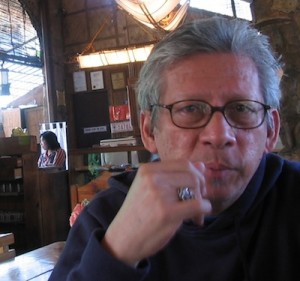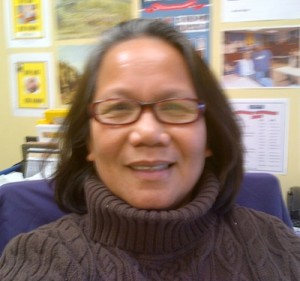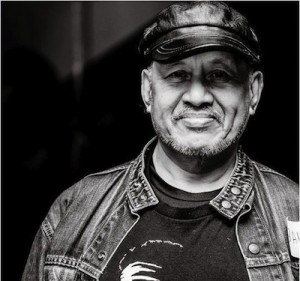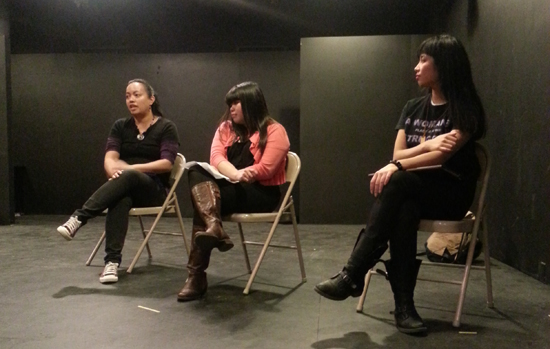Planning Summit 2013
Note from the editor: This text was originally delivered as a speech to the UniPro staff at April's staff meeting as written and performed by UniPro Vice President, Iris Zalun. For more information about UniPro's third annual Summit, or to purchase early bird admission (offer valid until 4/30), visit the event's Facebook event page. Scarily enough, Summit 2013 is quickly approaching. Even though it’s stressful, even though I’m losing sleep over it, even though Gecile and I spend hours and hours every week in meetings talking about logistics, speakers, the itinerary … I still love this shit.
But I didn’t always. Last year, as most of you already know, I was the Summit speaker chair. Which means I was in direct contact with almost 39 community figures and had to make sure they would actually show up on June 2nd. THAT is stressful. The emails, the meetings, the late hours … I asked myself, “Why? Why am I even doing this?” I wasn’t getting paid for what was essentially a second full time job. No one was. How was planning a small conference for a bunch of Filipino kids going to help me at all?
But I realized during last year’s Summit, it wasn’t about just helping myself. Last year, through all that hard work, through my bugging speakers for their bios, photos, magazine responses, and for their commitment to come to Summit at all, through the hard work of our co-chairs Rachelle and Judy, and our entire staff … we contributed to something bigger than ourselves, to the “Renaissance” of our people. It was a day to celebrate the successes of individuals from our community, from Tony Meloto, founder of Gawad Kalinga, which builds sustainable communities in slum areas, to Jose Antonio Vargas, Pulitzer Prize-winning journalist and undocumented immigrant, fighting for immigration reform, to Ayesha Vera Yu, who worked as an investment banker then used her business knowledge to found Advancement for Rural Kids, investing in poor, malnourished children in rural areas of the Philippines to help them climb out of poverty. It was a day to celebrate these individuals and to recognize the progress of the community due to their work, but also to acknowledge that more needs to be done. It was a day to inspire the eager delegates like us, the passionate leaders like us, the ambitious young lawmakers, nurses, and writers like us, who will take up the struggles of our community and the unfinished work of Tony Meloto, Jose Vargas, and Ayesha Yu, to make positive and tangible change.
Being in UniPro, to be sure, is damn hard work. Once in a while, all I want to do is just go home, not talk to anyone, and watch The Walking Dead in my bed. But I can’t b/c more often than not, I’m Google hanging out with at least three of you. Do I really care about watching Rick kill zombies? I mean, a little bit, but mostly no, because at the end of the day, I care about our development as leaders for the ultimate purpose of helping our community.
Filipino historian Renato Constantino said, and I’ve quoted him before, “Leadership is the opportunity to learn.” One reason why we are in UniPro is because in order to solve issues, we have to learn about the issues. Did you know that one in ten Filipina women aged 15-49 has experienced sexual violence? That the voter turnout rate among Fil Ams in ‘04 and ‘08 was at less than 10%? That the Philippines still adheres to laws set in place during the Spanish era? This, and so much more, is the kind of information our peers need to know, and which I learned because of UniPro.
Learn from our own events and from the amazing work of other community organizations. BAYAN-USA and its many chapters confront problems such as the trafficking of Filipino migrants. PAGASA provides programming for our senior citizens. FALDEF, AF3IRM, FACE, Kalusugan Coalition, Leviathan Lab … they all have worthy causes and it is our job as UniPro to provide a platform for them to reach the community.
The “community.” We always talk about the “community.” Who are the faceless and nameless members of the “community” that we are working so hard for? They are our peers - the youth who are curious about the issues, or who feel passionate about certain campaigns but may not have the knowledge or tools to take action. They are the disenfranchised and the underrepresented. They are the undocumented immigrants, hiding and afraid, whose families brought them here to pursue a dream, but whose “illegal” status is preventing them from following their own dreams. They are the migrant workers, vulnerable and eager for jobs, who are tricked into being trafficked. They are the hungry children who drop out of school to sell dried flowers in the streets, already broken by a system that has failed them. We cannot pass up this opportunity to help those whom opportunity has passed over. UniPro is that opportunity. Rise and grab it.
The State of Undocumented Immigrants
Note from the Editor: This post was submitted by emerging leader, Adinah Lagud. Adinah will be attending the upcoming State of Undocumented Immigrant Rights and Resources at the Philippine Consulate on April 18 at 6PM. Click here for more information about the event, to which you are invited to attend. The immigration debate, in recent weeks has garnered a substantial amount of attention in Congress. Though not a new issue, this increased attention was brought about by a bipartisan group in Congress known as the “Gang of Eight”. These members have been working on an all-inclusive immigration reform plan to present to Congress. With the rekindling of this national argument, I believe that it is particularly important for young leaders in the New York community, i.e. college students and Filipino organizations, to become actively engaged and cognizant of an issue that directly impacts the future of the Filipino and Fil-Am community.
As a leader in my own Filipino organization at Stony Brook University, I’ll readily admit if I was asked about my views on immigration a year ago today, I would have shrugged my shoulders in indifference. Not because I didn’t care about those struggling around me, but because I did not take the time to educate myself in order to formulate an opinion. I had ignorantly viewed “illegal” immigration as a matter pertinent to the west coast and their undocumented workers. After all, growing up in a conservative Southern town, that was dialogue surrounding me. I didn’t realize that the Philippines came in second (only after Mexico) in the number of annually distributed family based visas. These are the same visas that some members of Congress are looking to decrease. Not to mention that some petitions dating back to 1990 are still backlogged, so Filipinos have been waiting over twenty years to be reunited with their families.
In regards to undocumented immigrants living in the United States, people who relocated here as minors are able to apply for President Obama’s “Deferred Action for Childhood Arrivals” but only a little over 3,000 undocumented Filipinos have applied nationwide. To put this into context, 2009’s estimated amount of unauthorized immigrants from the Philippines was 270,000. It’s safe to assume, many are not taking advantage of the resources available to them. Whether it is caused by fear, shame, misunderstanding, or pride, immigration reform is not a topic limited to other minority groups, we Filipinos are standing at the forefront of this issue.
I urge young adults, students, and Filipino clubs to take this up as an important issue to be educated on. We need to support organizations and institutions in our community who are working towards creating a viable way to distribute information and resources on immigration. If we collectively become informed and engaged on this debate, we have the power to thwart incorrect assumptions on undocumented immigrants and the immigration process as a whole within the Filipino and New York community.

UniPro's The Vagina Monologues: Breaking the Maria Clara Image, Indeed
Moans, writhes, orgasms … it wasn't your typical UniPro event. On March 9, UniPro hosted The Vagina Monologues: Breaking the Maria Clara Image at Cap21 Studios. Based on interviews with real women, The Vagina Monologues is a play by Eve Ensler featuring hilarious, heartbreaking and uncomfortable confessions from different women about their, well, vaginas, relating to their personal stories of femininity and sexuality.
UniPro’s The Vagina Monologues production starred an all-Pilipina cast, with a special Pilipina twist added to parts of the script. In one monologue, for example, a “lola” ashamedly discussed her “down there.” Then at the end of the play, the cast stood side by side onstage, taking turns to share disturbing facts about victims of sexual violence:
"One in three women on the planet will be beaten or raped in her lifetime. That’s more than one billion women living on the planet today."
"The NDHS revealed that one in five women aged 15-49 has experienced physical violence since age 15."
"One in ten Filipino women aged 15-49 has experienced sexual violence."
Following the play was a panel of representatives from various women’s rights organizations. These distinguished women included Ivy O. Suriyopas, Director of the Anti-Trafficking Initiative at AALDEF; Kristina K. Joyas, a member of AF3IRM (and UniPro’s Director of Staff Development); and Zarah K. Viñola, Vice-Chairperson for FiRE. They discussed ways their organizations are tackling issues that affect Pilipinas, as well as their own definitions of the term “feminist.”
Confronting topics ranging from rape and sexual violence to self-image and self-discovery, the night was emotional and thought-provoking. It was a seamless event and production, organized by Kirklyn Escondo, our Community Building Director, and directed by Precious Sipin and Leslie Espinosa. Music also added to the drama of the play, with Andre Ignacio Dimapilis on the didgeridoo and Andy Jean-Gilles on the djembe drums. Lastly, Stella Ma also spoke on behalf of the NYC Chapter of the National Pacific American Women’s Forum, informing the audience of the recent publication of their Health Resource Guide.
It’s rare seeing Pilipinas onstage, portraying characters with real depth to whom we can actually relate. It’s a stark difference from the roles Asian Americans are usually degraded to: the token Asian friend, unnamed nerd or exotic lover. Let’s not forget the title of our production, which references Maria Clara, the iconic character from Jose Rizal’s Noli Me Tangere. This tragic heroine is known for her sweetness and obedience; she is a symbol (or perhaps a caricature) of the ideal Pilipina. Well, with all the talk of vaginas that Saturday night, the strong and talented women of UniPro’s production of The Vagina Monologues couldn't be any farther from Maria Clara.
UniPro's People Power Anniversary Panel 2013
The People Power Revolution (sometimes referred to as the EDSA Revolution) is considered one of the most pivotal events in Pilipino history, marking the end of Ferdinand Marcos’ 20-year authoritarian reign and the return of democracy to the country. The movement was sparked in 1983 by the assassination of Ninoy Aquino, a senator and leader in opposition of Marcos’ governance. A campaign of nonviolent protests and demonstrations continued over the course of three years, culminating in February of 1986 with a demonstration of over 2 million participants, including civilians, military and religious groups, notably led by the Archibishop of Manila, Cardinal Sin.As part of the State of Pilipino American Advocacy Series (SoPAAS), UniPro will be hosting a panel to commemorate the 27th anniversary of the People Power Revolution on February 19th, 2013. The panelists will speak on the history of Pilipino and Pilipino-American advocacy work through the story of the 1986 Revolution. They will discuss the importance of the revolution in Philippine and world history, and its relevance to today. The event will take place at the Philippine Consulate (556 Fifth Ave.) from 6:30 to 9:00 PM, with a suggested donation of $5 for entrance (donations to UniPro are tax deductible). It will be a great opportunity to learn and engage in discussion about this pivotal and historic event that has shaped the Philippines. Here is a little bit about our panelists:

Luis H. Francia is an award-winning author and poet, who also teaches Philippine-American literature at Hunter College, and Philippine language at New York University. His books include A History of the Philippines: From Indios Bravos to Filipinos, and his memoir Eye of the Fish: A Personal Archipelago, which won both the PEN Open Book Award and the Asian American Writers award.

Isabelita Sombillo was the Secretary General of SELDA, an association of former political prisoners in the Philippines. She studied at the University of Philippines, Los Banos and worked in the progressive movement against Marcos’ governance in the years before the revolution began. She was held as a political prisoner from 1983-1986 by the Marcos regime. She has been a 1199SEIU Union organizer since 2000.

Baltazar 'Bal' Pinguel is the former national director of Peacebuilding and Prevention of Conflict Program for the American Friends Service Committee (AFSC). For his activism, Bal was detained twice, tortured and involuntarily 'disappeared' by the Marcos Dictatorship. Upon his release from his second detention in 1985, Bal became a founding member and officer of Bagong Alyansang Makabayan or BAYAN, the largest anti-dictatorship grassroots coalition in the Philippines. Aside from serving as BAYAN's Deputy Secretary General, Bal was also the Director of the Popular of Struggle Commission of BAYAN. It was BAYAN's Popular Struggle Commission that developed the strategy of 'welgang bayan' or people's strike which was ultimately embraced by the Filipino people in the non-violent overthrow of Philippine dictator, Ferdinand Marcos, in 1986.





